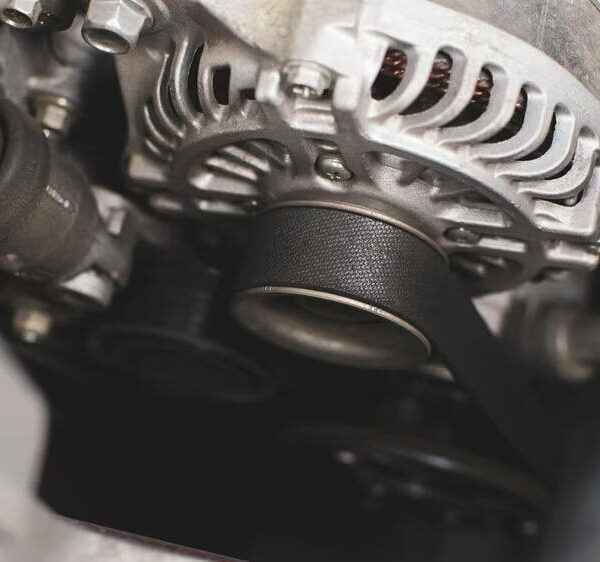Alternator Repair
Trouble Starting Your Car? It Could Be Your Alternator.
Ever found yourself in the driver’s seat, turning the key, and hearing nothing but silence? Your engine seems to hesitate, and your battery is struggling, leaving you stranded. Enter the unsung hero – the alternator. This vital component not only propels your car forward but also generates the mechanical energy and charges the battery while you’re on the move. Without it, your car might just decide to take an extended break in your driveway. Don’t wait until you’re stuck on the side of the road – keep an eye (and ear) out for signs of a faltering alternatorIf you notice any issues, it’s crucial to consider alternator repair to keep your vehicle in top shape.
Affordable Alternator Repair Solutions at Bay European
Is your alternator giving you a hard time? Before heading to the usual spot, give us a shout at Bay European. Our skilled alternator repair specialists are ready to chat, offering insights into potential costs and ensuring you’re paired with the perfect expert for the job. Your time is precious, and so is your four-wheeled companion – let’s get that alternator sorted with a quick call to Bay European.
Schedule your alternator repair with the Bay European team.
Our Proven Alternator Repair Process
When you roll into Bay European, our seasoned team will run a meticulous alternator inspection to unearth any issues. No secrets here – we’ll lay out all your options before making a move. Our alternator repair service covers:
- A comprehensive alternator check, including a voltage reading
- Scrutiny of alternator wiring for loose connections or broken circuits
- Evaluation of alternator regulator function
- A check on battery voltage
- Examination of the drive belt for cracks or misalignment, with adjustments made as necessary
- Inspection of pulleys and bearings for signs of wear and tear
Recognising Signs of Alternator Issues
Curious about potential problems with your car’s alternator? Pay attention to these signals:
- Battery Warning Light: Keep an eye on the dashboard’s battery-shaped light. If it’s bright, your alternator may be signaling an issue.
- Irregular Lights: If your car’s internal or external lights appear dim or flicker, it could indicate a glitch in your alternator.
- Sluggish Gadgets: Do your power windows, air conditioner, or stereo operate slowly? Your alternator might be a factor.
- Unexplained Dead Battery: Discovering a mysteriously dead battery? This could be a subtle alert from your alternator.
- Starting Challenges: If your vehicle hesitates or struggles to start, your alternator might be experiencing difficulties.
- Frequent Stalls: Picture your car taking unplanned breaks during a drive. If it stalls often, it’s time to check your alternator.
- Unusual Sounds: Cars shouldn’t produce growling or whining noises. If yours does, it might be your alternator creating unusual sounds.
- Burning Smell: Detecting a burning odor, unrelated to breakfast? Investigate, as it could be a sign from your alternator.
Don’t dismiss these signs! If you suspect alternator issues, contact Bay European today. We’re here to ensure you stay on the road smoothly.
Contact Us Now to schedule your alternator repair and keep your wheels spinning smoothly!
FAQ
What is an alternator?
An alternator is a crucial part of a car’s electrical system. Its main job is to turn the engine’s power into electricity, keeping things like lights and air conditioning working. Think of it as a charging station for the car’s battery while you drive. However, over time, the alternator can wear out and cause problems. That’s when you might need alternator repair, fixing it up to work well again, or alternator replacement, swapping it out for a new one if fixing isn’t enough. So, the alternator is essential for making sure all the electrical stuff in your car works properly. If it acts up, getting it checked or replaced will help keep everything running smoothly.
How does an alternator work?
An alternator operates as a mini power plant within your car. When the engine runs, it turns a component called the rotor, generating a magnetic field. This magnetic field produces electricity in the stator, which is then converted into the type of electricity your car needs. This electrical power serves two main purposes: charging the car’s battery and running various electrical components like lights and the air conditioner while you drive. Essentially, the alternator ensures a continuous supply of electricity to keep your car’s essential systems functioning whenever the engine is running.
How do test an alternator?
Testing an alternator involves a few steps:
- Visual Inspection: Check for any visible issues such as loose wires, frayed belts, or signs of damage.
- Check Battery Voltage: Before starting the engine, measure the voltage of the car battery using a multimeter. A healthy battery should read around 12.6 volts.
- Start the Engine: Turn on the engine and let it idle. With the engine running, measure the voltage across the battery terminals again. It should read higher than the initial voltage, indicating that the alternator is working to recharge the battery.
- Load Test: Increase the engine speed to around 2000 RPM and turn on electrical components like headlights and the air conditioner. The voltage should remain steady or slightly increase, confirming the alternator’s ability to handle increased demand.
- Diode Test: Use a multimeter to check the alternator’s diodes for any issues. Consult the vehicle’s manual for specific testing procedures.
- Listen for Unusual Noises: Strange sounds, such as grinding or whining, could indicate alternator problems.
If the alternator fails any of these tests, it may require further inspection or professional alternator repair or replacement.
How to know if it is the battery or alternator at fault?
Distinguishing between a faulty battery and alternator involves a few checks:
- Check Engine Light: If the check engine light is on, it might indicate issues with the alternator.
- Dim Lights: Dimming headlights or interior lights when the engine is running can suggest an alternator problem.
- Battery Age: Consider the age of the battery. Most batteries have a lifespan of around 3-5 years. If yours is older, it could be the culprit. Book your car battery replacement with us.
- Starting Troubles: If the engine struggles to start or won’t start at all, it could be a sign of a weak battery.
- Battery Voltage: Use a multimeter to measure the battery voltage. A healthy battery should read around 12.6 volts. If it’s significantly lower, the battery might be the issue.
- Alternator Tests: Follow the steps mentioned earlier to test the alternator. If the alternator is not charging the battery, it might be the source of the problem.
- Jump Start Test: Jump-start the car. If it starts but then dies shortly after, it could indicate an alternator problem. If it runs fine, the battery may be at fault.
If you’re unsure, it’s advisable to consult a professional mechanic to accurately diagnose and address the issue.
Schedule car alternator repair today
Book your car alternator repair today to keep your vehicle running smoothly. If you’ve noticed issues like dim lights or a weak battery, it’s time to get your alternator checked. Our skilled technicians are ready to inspect and fix any problems, ensuring your car’s electrical system works well.
Avoid unexpected breakdowns and make sure your battery stays in good shape. A quick alternator repair can save you from getting stranded and keeps your vehicle reliable.
Don’t wait—schedule your car alternator repair with us now. Our friendly team is here to make sure your car stays in top condition, giving you peace of mind on the road.

